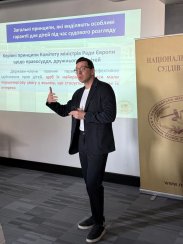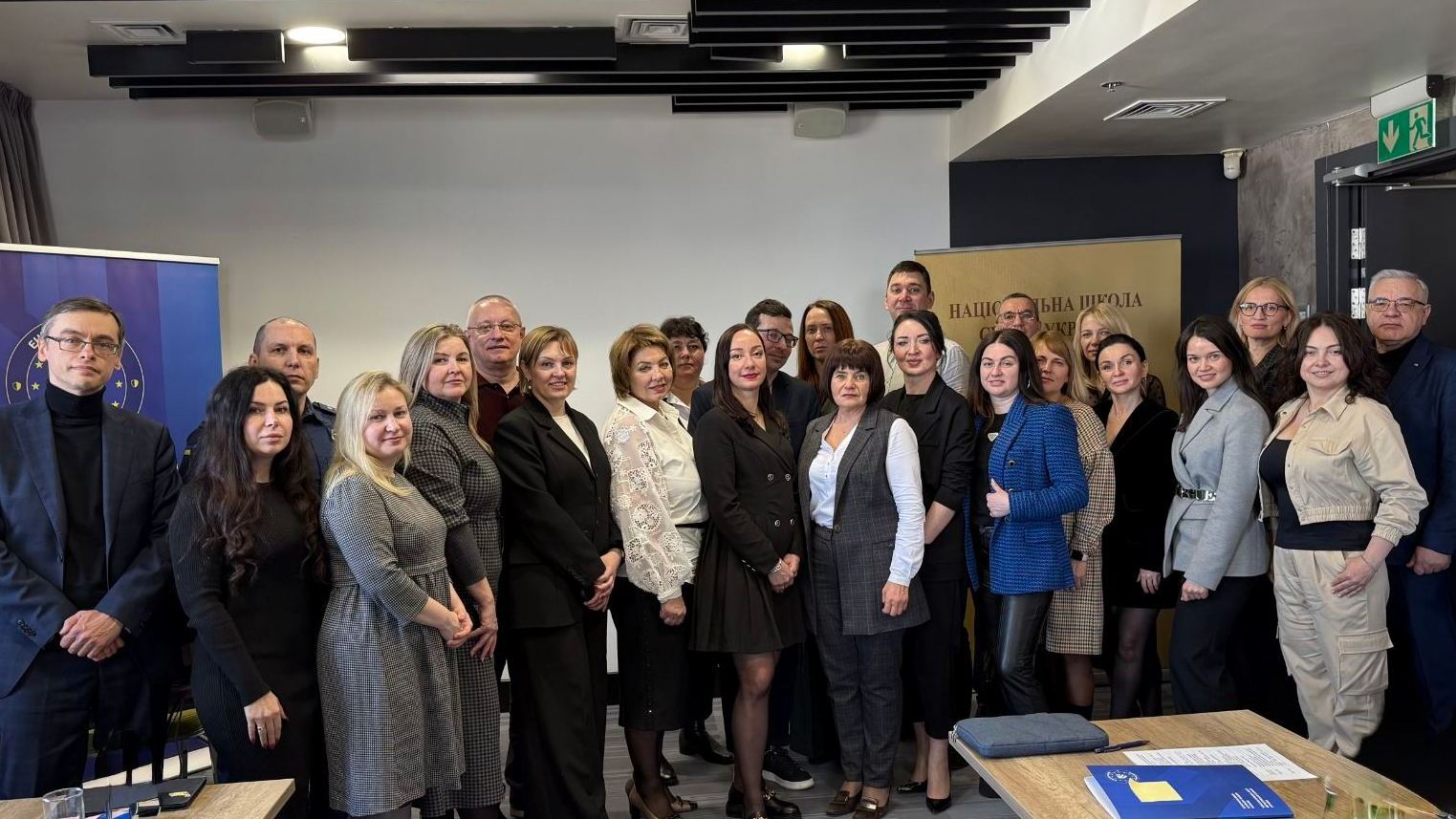Contact center of the Ukrainian Judiciary 044 207-35-46

Why children are a vulnerable group; what general principles determine special guarantees for children during court proceedings; what child-friendly justice is in practice and the peculiarities of the trial involving children as a vulnerable group were discussed by Supreme Court Judge of the Civil Cassation Court Pavlo Parkhomenko at the training for trainers ‘Peculiarities of court proceedings involving vulnerable groups’.
Pavlo Parkhomenko delivered a lecture on ‘Children in court proceedings as a separate category of vulnerable groups’. He noted that children need constant care and protection, have a changeable psycho-emotional state, dependence on adults, their low psychological stability often becomes an object of manipulation and physical, psychological and sexual violence, etc. This, the lecturer said, necessitates a special approach to cases involving children.
The Guidelines of the Committee of Ministers of the Council of Europe on Child Friendly Justice stipulate that Member States should guarantee the effective exercise of children's rights so that their best interests are a primary consideration in all matters relating to or affecting them. The Civil Procedure Code of Ukraine emphasises that the court shall facilitate the creation of appropriate conditions for the exercise by a minor or underage person of his or her rights determined by law and provided for by an international treaty ratified by the Verkhovna Rada of Ukraine (part 3 of Article 45 of the Code). Pursuant to part 2 of Article 10 of the CPC of Ukraine, minors enjoy additional guarantees during their participation in criminal proceedings.

The lecturer emphasised the importance of ensuring the best interests of the child during court proceedings in cases involving children. Pursuant to para. 1 of Art. 3 of the Convention on the Rights of the Child, the child has the right to have his or her best interests assessed and taken into account as a primary consideration in all actions and decisions taken in relation to him or her, whether in the public or private sphere. The General Comment No. 14 (2013) on the right of the child to have his or her best interests as a primary consideration states that the best interests of the child is a right, a principle and a rule of procedure based on an assessment of all the elements reflecting the interests of the child or children in the particular circumstances.
In order to determine the best interests of the child, it is necessary to determine what the relevant elements are in a particular case, to give them specific content and to determine the significance of each of them in relation to the others. In particular, it is necessary to take into account such elements as the child's views, individuality, preservation of the family environment and maintenance of relationships, care, protection and safety of the child, his or her vulnerable situation, the child's right to health and education, etc.
Pavlo Parkhomenko drew attention to the ECHR case law, which states that it is in the best interests of the child to, firstly, maintain his or her ties with the family (unless the family is particularly unsuitable or clearly dysfunctional), and secondly, ensure his or her development in a safe, secure and stable environment that is not dysfunctional.
The lecturer also focused on the peculiarities of the trial involving children as a vulnerable group. He noted that child-friendly justice, in practice, requires the involvement of competent specialists in various fields. At the same time, the Guidelines of the Committee of Ministers of the Council of Europe on child-friendly justice state that while the judiciary has the ultimate competence and responsibility for making the final decision, Member States should, where appropriate, make joint efforts to establish multidisciplinary approaches to assess the best interests of children in proceedings involving them. And the UN Committee on the Rights of the Child's General Comment No. 24 (2019) on the rights of the child in the child justice system focuses on the importance of continuous and systematic training for child justice professionals. At the same time, interdisciplinary team professionals, in addition to the ability to work in a team, should be well informed about the physical, psychological, mental and social development of children and adolescents, as well as the special needs of the most disadvantaged among them.
Part of Pavlo Parkhomenko's lecture was devoted to the provision of child-friendly space during the consideration of the relevant category of cases. He spoke about the Green Room, Barnahus and Child Friendly Courtroom models.
The Green Room methodology can be used by judges and other child protection actors to interview (interrogate/question) a child, taking into account his or her age and psychological characteristics and in conditions that minimise and prevent repeated trauma to the child's psyche. ‘Barnahus (Barnahus, translated from Icelandic as ‘child's home’) is a model of an interdisciplinary and interagency approach that guarantees cooperation between different organisations (judicial, public, medical) in one, comfortable for the child's stay, where children and families are offered the necessary help and support under one roof. The lecturer also used examples to describe the special design of a courtroom for hearing cases involving children. This courtroom does not have a booth for the accused, it is decorated in special light colours, it has special pictures and memos explaining rights and obligations, the participants in the court session are on the same level (without elevations), and the child is supposed to be in close proximity to his or her parents, legal representative, etc.
The judge also addressed the issue of ascertaining the child's opinion. He noted that it is sometimes mistakenly believed that the child's opinion can only be ascertained after he or she reaches the age of ten or fourteen (Article 160 of the Family Code of Ukraine, Articles 29, 31 of the Civil Code of Ukraine). At the same time, Article 171 of the Family Code of Ukraine stipulates that a child has the right to be heard by parents, other family members, and officials on matters concerning him or her personally, as well as family issues. The speaker noted that international instruments do not impose any age limit on the child's right to express his or her views, and States Parties are not encouraged to impose age limits in law or practice that would impair the child's right to be heard in all matters concerning his or her interests.
The training, organised by the National School of Judges of Ukraine with the support of the European Union Advisory Mission (EUAM Ukraine), took place on 6-7 March 2025.
Pavlo Parkhomenko's presentation is available at – https://court.gov.ua/storage/portal/supreme/prezentacii_2025/Prezent_Ditu_v_sud_prov_1.pdf.